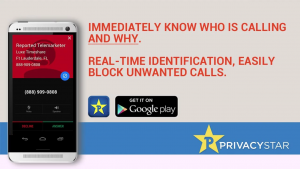Mobile Scams – Are You Being Safe?
 In today’s world it seems like everyone you know has a cell phone. They have become an active part of our world and many of us cannot live without them. Despite their popularity, many of us still do not know how to use them correctly. I’m not talking about not knowing how to set customize ringtones, putting your phone in silent mode, or how to install apps. I’m talking about good common sense.
In today’s world it seems like everyone you know has a cell phone. They have become an active part of our world and many of us cannot live without them. Despite their popularity, many of us still do not know how to use them correctly. I’m not talking about not knowing how to set customize ringtones, putting your phone in silent mode, or how to install apps. I’m talking about good common sense.
First Orion is a company that creates apps, like PrivacyStar, that are Caller ID on steroids. They give you real-time information on the person calling you. Like traditional Caller ID the apps give you the name and number of the caller. They also give you more information like whether or not the number is possibly a debt collector, a solicitor and so on.
As part of their product marketing strategy, they conducted a survey to see how mobile users fall for scams. For their survey they interviewed 1,000 American adults who owned mobile phones. They asked them various questions geared towards their experiences with telemarketers and scammers.
One of the questions asked was whether the person had ever provided their credit card information to a scammer. Of those interviewed, 4% indicated that they had. If this 4% holds true for more than the 1,000 participants, we are looking at roughly 15 million people, in America alone, that have given away their credit card information.
In 2015 a similar survey found that 1% of those surveyed gave out their Social Security Numbers to scammers. The latest survey found that 2.4% of those interviewed gave out their Social Security Number in 2016. That is close to 10 million people giving away their Social Security Number this year!
The survey had a lot of other interesting tidbits:
– 52 percent of the survey participants considered receiving unwanted calls to their mobile phones to be an annoyance.
– 59 percent of those surveyed do not know their rights when it comes to telemarketers and debt collectors.
– Half believed that their phone carrier should be responsible for protecting them from scams.
– Two thirds said they would choose a phone carrier that automatically blocked unwanted calls from reaching them over another company that did not block unwanted calls.
 Jonathan Sasse, CMO of First Orion says, “Scammers are getting more aggressive and becoming more effective at targeting our mobile phones. Nearly three-quarters of the people we surveyed received a scam call this year, which is over 60 million more mobile phone owners than in 2015. Our PrivacyStar solution identifies and blocks unwanted calls from robocallers and scammers for millions of customers every day, but tens of millions more are still vulnerable to abuse.”
Jonathan Sasse, CMO of First Orion says, “Scammers are getting more aggressive and becoming more effective at targeting our mobile phones. Nearly three-quarters of the people we surveyed received a scam call this year, which is over 60 million more mobile phone owners than in 2015. Our PrivacyStar solution identifies and blocks unwanted calls from robocallers and scammers for millions of customers every day, but tens of millions more are still vulnerable to abuse.”
First Orion obviously has a vested interest in these numbers. They back up the reason for their existence and help them sell more of their services to the end-user. Despite the possible bias, I agree with them that we need to make sure that we are using common sense when using our devices. I work in the payroll industry and it is hammered in to us that we don’t give banking or personal information to anyone. The same concept should be applied universally and should be practiced all the time. Even if you don’t choose to use First Orion’s offerings we should all take the findings from the study and be a little more careful.
If you are interested in learning more about First Orion’s offerings, you can check them out at FirstOrion.com.


